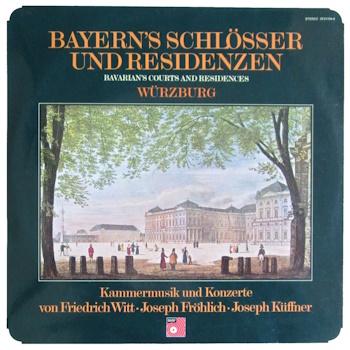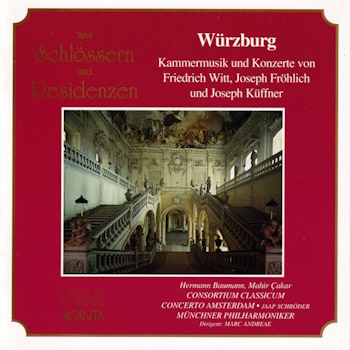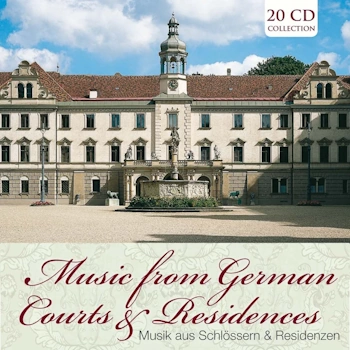 |
|
2 LPs
- 29 21194-0 - (p) 1972
|
 |
| 2 CDs -
44 2163-2 - (c) 1993 |
|
WÜRZBURG
|
|
|
|
|
|
|
|
| Friedrich
WITT (1771-1837) |
Quintett
Es-Dur für Klavier, Oboe,
Klarinette, Horn und Fagott, Op. 6
|
LP 1 |
|
23' 31" |
|
|
-
Allegro moderato
|
|
7' 02" |
|
A1 |
|
-
Adagio cantabile
|
|
6' 07" |
|
A2 |
|
-
Menuetto: Allegro molto |
|
5' 17" |
|
A3 |
|
-
Finale: Allegro
|
|
4' 59" |
|
A4 |
| Joseph KÜFFNER
(1776-1856) |
Trio
A-Dur für Klarinette, Viola und
Gitarre, Op. 21 |
LP 1 |
|
10' 42" |
|
|
-
Andante con moto
|
|
1' 40" |
|
B1 |
|
-
Thema: Allegretto · Variationen ·
Allegro |
|
9' 02" |
|
B2 |
|
(Dieter Klöcker:
Klarinette | Jürgen Kussmaul:
Viola | Rolf Hock: Gitarre)
|
|
|
|
|
| Joseph FRÖHLICH
(1780-1862) |
Serenade
D-Dur für Flöte, Klarinette, Viola
und Violoncello
|
LP 1 |
|
11' 16" |
|
|
-
Larghetto
|
|
3' 19" |
|
B3 |
|
-
Allegretto
|
|
2' 08" |
|
B4 |
|
-
Andante con variazioni
|
|
3' 42" |
|
B5 |
|
-
Polonaise |
|
2' 04" |
|
B6 |
|
(Frans Vester:
Flöte | Dieter Klöcker: Klarinette
| Jürgen Kussmaul: Viola | Anner
Bylsma: Violoncello)
|
|
|
|
|
| Friedrich WITT |
Konzert
F-Dur für 2 Hörner und Orchester |
LP 2 |
|
17' 30" |
|
|
-
Allegro
|
|
9' 52" |
|
C1 |
|
-
Romanze |
|
3' 58" |
|
C2 |
|
-
Rondo |
|
3' 36" |
|
C3 |
|
(Hermann Baumann,
Mahir Çakar: Horn) |
|
|
|
|
| Friedrich WITT |
Sinfonie
A-Dur
|
LP 2 |
|
23' 05" |
|
|
-
Adagio · Allegro vivace
|
|
7' 15" |
|
D1 |
|
-
Menuett
|
|
5' 00" |
|
D2 |
|
-
Andante
|
|
7' 15" |
|
D3 |
|
-
Finale: Allegretto
|
|
3' 31" |
|
D4 |
|
|
|
|
| Friedrich WITT:
Quintett Es-Dur |
Friedrich
WITT: Konzert F-Dur
|
Friedrich
WITT: Sinfonie A-Dur
|
|
|
|
|
|
CONSORTIUM
CLASSICUM
|
CONCERTO
AMSTERDAM
|
MÜNCHNER
PHILHARMONIKER |
|
| - Werner Genuit, Klavier
|
Jaap SCHRÖDER,
Leitung
|
Marc ANDREAE,
Dirigent |
|
| - Gernot Schmalfuß,
Oboe |
|
|
|
| - Dieter Klöcker, Klarinette |
|
|
|
| - Werner Mezendorf,
Horn |
|
|
|
| - Karl-Otto
Hartmann, Fagott |
|
|
|
|
|
|
|
Recorded
at: |
|
-
|
|
|
Live / Studio
|
|
Studio |
|
|
Producer |
|
-
|
|
|
Balance engineer
|
|
-
|
|
|
First LP Edition
|
|
BASF
| 29 21194-0 | 2 LPs | durata
45' 29" - 40' 35" | (p)
1972
|
|
|
First CD Edition |
|
PILZ
- ACANTA | 44 2163-2 | 2 CDs |
durata 45' 29" - 40' 35" | (c)
1993 | ADD
|
|
|
Note |
|
-
|
|
|
|
|
Musik
aus Schlössernb &
Residenzen
(20 CD Collection)

Membran |
234355 | (c) 2016
(in CD 7
& 8)
|
Constructed
in the first half of the 18th
century and brilliantly
decorated by the leading artists
of the day, the superb, lavishly
built Würzburg Residenz came to
symbolize a culturally active
court of which music, too, was
an integral part. Under the
patronage of the Prince-Bishops
Friedrich Karl von Schönborn and
Adam Friedrich von Seinsheim
music here reached its zenith.
Up until the middle of the
eighteenth century all the
important musical figures at the
court, the Kapellmeisters and
composers, were Italian, but
later more and more local talent
came to the fore. Without opera,
concerts and festive church
music court life was
unthinkable. The court orchestra
provided for both court
ceremonial and pleasant
diversion. As was customary at
the smaller courts some of the
musicians also served as valets
or footmen or were otherwise
employed.
When, in 1802, as a result of
the secularization of the
ecclesiastical principalities,
the Episcopal Palace of Wurzburg
fell to Bavaria, music at the
court had long been largely
confined to church services,
and, with the end of the
Wurzburg Grand Duchy (1806 -
1814) court music ceased to
exist altogether. For several
decades the citizens of Wurzburg
had been upholding the city’s
musical tradition in lieu of the
court. Thus after 1770 we find
chamber music concerts being
organized by various groups of
music-lovers in the town and a
Collegium musicum. In 1803 the
city instituted something which
was to set an example for the
whole of Germany. The musical
journal, Leipziger Allgemeine
Musikalische Zeitung, reported
in June 1804 that: „In Wurzburg
there has been in existence for
some time now an extremely well
supported musical society made
up of professional men, at the
head of which was the young
lawyer Herr Fröhlich, a most
able musician in respect of both
the theory and practice of the
art. His fruitful efforts have
procured for him now a position
as... teacher and director with
a salary of 400 guilders. For
those young persons wanting to
follow an academic course in
music this is an institution
indeed quite unique in Germany,
and deserves to be copied by
other universities.“ Thus
Germany’s oldest state music
academy came into being.
Franz Joseph Fröhlich (1780-
1856), who was born in Wurzburg,
directed the „Royal School of
Music“, as it was then called,
for no less than 54 years,
during which time its reputation
grew steadily, both as an
institute of learning and as a
concert centre. Unfortunately,
as the result of wars,
practically all of Fröhlich’s
compositions have been lost. His
Serenade for Wind Instruments
and Strings, one of the very few
works from his pen remaining to
us, is indeed proof of his great
ability.
Joseph Küffner (1777 - 1856),
son of a Wurzburg court
Kapellmeister, was himself a
court musician at Wurzburg and
also a military director of
music. After 1814 he devoted
himself entirely to composing.
According to one of his
contemporaries Küffner believed
„that by paying homage to
contemporary taste he could
reach a wider public and better
recommend himself. His first
three serenades were written for
guitar, flute and alto and were
received with rapturous
applause.“ These attractive
period pieces still have a
definite appeal today, not least
on account of the delightful way
the three instruments are used.
Küffner produced several hundred
works altogether. He was held in
considerable esteem in the
mid-nineteenth century, as the
following extract from Gaßner’s
dictionary of music (1849)
shows: „Küffner has proved
himself to be an excellent
composer and is highly regarded
in all countries. He leads a
simple life, his little house
and garden cut off from the rest
of the world, so neat, pretty
and clean that one is almost
envious, and showing from its
exterior that it is the home of
a contented man.“
Although Küffner being a
fashionable composer was
undoubtedly very popular,
Friedrich Witt (1770 - 1836)
must be regarded as Wurzburg’s
greatest musician after the turn
of the century. Witt was the
last of the Wurzburg court
Kapellmeisters and continued to
run the city’s music after 1814
as well, directing church,
theatre and concert
performances. His name recently
became known again in our
century when it was discovered
that he was the real composer of
the „Jena“ Symphony, previously
thought to be an early work of
Beethoven’s. Before moving to
Wurzburg he was employed at the
court of the Prince of
Oettingen-Wallerstein as
violoncellist and took lessons
there from Antonio Rosetti, who
was the court Kapellmeister at
the time. At the Wallerstein
court solo concertos for one or
two horns enjoyed much
popularity and consequently Witt
was also inspired to write some.
His concert in F major for two
horns, a work demanding a
considerable amount of technical
accomplishment, certainly
justifies the contemporary
allusion to „the brilliant
wealth, the forcefulness and
diversity of his ideas“. It is
not without fascination to
recall that the young Richard
Wagner worked under Friedrich
Witt, when the latter was choral
director at the Wurzburg
theatre, and composed his first
opera „Die Feen“, there.
Dr. Robert
Münster
|
|